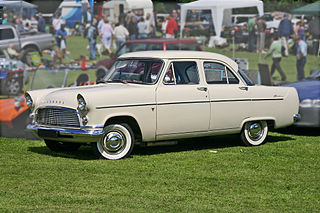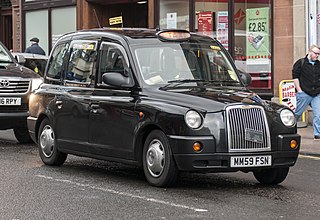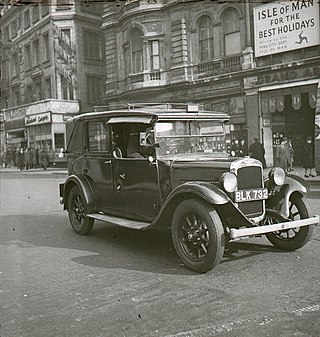History
The origins of The London Taxi Company can be traced to 1919, when Robert 'Bobby' Jones, a former general manager at coachbuilder Hollick & Pratt took over the coachbuilding operations of his then employer, timber merchants Gooderhams and set up in business in premises acquired from Thomas Pass in West Orchard, Coventry. [1]
1919–1954
Standardised Coachwork


Rather than make bespoke bodies to individual designs, Carbodies set out to produce coachwork to a number of standardised designs for car companies that did not have their own coachbuilding facilities. Their first major customers during the 1920s were MG and Alvis Cars. The scale of a new contract to build bodies for the MG M-Type Midget meant that they needed larger premises and in 1928, they moved to a larger site on Holyhead Road, where they remain to this day. In the 1930s, they supplied bodies for Rover, Invicta and Railton, but by far their biggest and most important customer in that decade was the Rootes Group.
During World War II the company made bodies for military vehicles. They also acquired press tools through the Lend-Lease scheme, which enabled them to make aircraft components. In 1943, Carbodies also became a limited company at this time, with Bobby Jones as governing director and his son, Ernest Jones managing director. [2]
Taxicabs, Convertibles, Daimlers and other Postwar Vehicles
After the war, Carbodies negotiated with London taxi dealer Mann & Overton and Austin to make bodies for the Austin FX3 taxi, introduced in 1948, as well as finishing and delivering the complete vehicles. More than 7,000 FX3s, mainly destined for London, were produced over 10 years. They also developed a system for turning modern all-steel saloon cars into convertibles. This work was carried out on the early unit construction Hillman Minx, the Austin Somerset and Hereford, the Ford Mk1 Consul and Zephyr and, later the Mk2 Ford Consul, Zephyr and Zodiac.
BSA ownership (1954–1973)
In 1954, Bobby Jones sold Carbodies to the BSA Group, who put it under the control of its prestige car company, Daimler. Although it was intended for Carbodies to become the manufacturing plant for Daimler steel bodies, this was never fulfilled. It did, however convert the Conquest saloon into a drophead, using the same methods they used on Fords and Austin and also made a drophead coupe body for the Daimler Conquest Roadster and made bodies for the Daimler Majestic and Majestic Major saloons.
Under BSA, manufacturing facilities were extended and more plant installed. In 1958, Carbodies began manufacturing the body and carrying out the assembly, finishing and delivery of the most important vehicle in their history, the Austin FX4 taxi. Carbodies also supplied prototype bodies and tooling, projects including the Jaguar E-type bonnet and panels for Triumph, Ariel and BSA motorcycles and scooters.
Further contracts undertaken during the 1960s and early 1970s were the conversion of Humber Hawk and Super Snipe, Singer Vogue and Triumph 2000 saloons into estate cars, but gradually, as contract work on private cars and commercial vehicles fell away, the FX4 taxi would become more important for the company.
In 1971 Carbodies bought the FX4 chassis assembly line from British Leyland's Adderley Park, Birmingham factory and moved it to Coventry, making them complete manufacturers of the FX4, in actuality if not in name. [3]
Manganese Bronze ownership (1973–2013)
In 1973, Carbodies was included in the sale of BSA to Manganese Bronze Holdings. [4] In the 1970s, Carbodies tried to make a new taxi of their own, the FX5, but it was abandoned in 1979 because the development costs were too high.
In 1982 Carbodies took responsibility for the complete manufacture of the FX4 taxicab, after British Leyland lost interest in it. [5] By this time, the FX4 was the company's only product, despite attempts to introduce new lines, such as a Ford Cortina MkV convertible and the Range Rover Unitruck. A new model of taxi, the CR6, based on a Range Rover bodyshell was abandoned after almost five years of development. In 1984, the London taxicab dealer Mann & Overton was bought by Manganese Bronze Holdings. Pending the development of a new model, the FX4 was further developed and became the LTI Fairway.[ citation needed ]
Rebranded as London Taxis International
In 1992 the company was rebranded London Taxis International with three divisions: LTI Carbodies, LTI Mann & Overton and London Taxi Finance.[ citation needed ]
In 1997, a new model of taxicab, the TX1 was introduced as a successor to the FX4. Further development resulted in the launch in 2002 of the TXII, powered by a Ford Dura Torq 2.4-litre diesel engine and featuring an integral fold-down ramp for wheelchair users. It also has an intermediate step and swivel-out seat for passengers with moderate walking difficulties. For people with hearing problems it has an induction loop incorporated in the intercom system.[ citation needed ]
In 2007 the TXII was replaced by the TX4. This series established LTI Vehicles as a worldwide supplier of London-type taxis.[ citation needed ]
In October 2010 the London Taxis International was rebranded as The London Taxi Company. A joint venture with Chinese car maker Geely, who already held a 20% interest in the company through its Manganese Bronze shareholding, was formed to build a factory in Shanghai to manufacture London taxis for the export market and to supply components to the home factory in Coventry. [6] [7] In 2010 the Mann & Overton trading name was dropped.[ citation needed ]
Administration
In October 2012, following a suspension of sales due to the discovery of a serious flaw with vehicle steering components and having failed in an attempt to obtain new financing, the company was placed in voluntary administration. [8] [9] The quite recently specified faulty steering components had been sourced from Geely supplier, Gang Yang in China. [10] [11]
In February 2013, certain assets of The London Taxi Company were purchased from administrator PricewaterhouseCoopers by Geely. [12] [13] It continued to trade as The London Taxi Company until rebranded as the London EV Company in September 2017 developing electric commercial vehicles at a new plant near Coventry, the first into production being an electric taxicab - the LEVC TX. [14]


























































